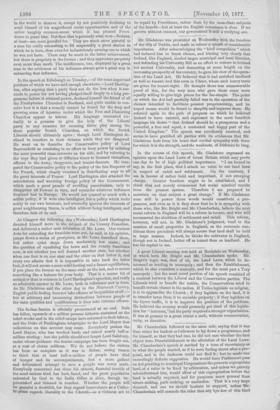In the speech at Edinburgh on Tuesday,—of the most important
portions of which we have said enough elsewhere,—Lord Harting- ton, after arguing that a party does not do the less when it sue- coeds to power for not having pledged itself deeply to a long pro- gramme before it attained power, declared himself the friend of all the Presbyterian Churches in Scotland, and quite unable to con- ceive how it is that a remedy cannot be found for the deep and growing sense of injustice under which the Free and Dissenting Churches appear to labour. His language amounted vir- tually to a promise to give the help of the Liberal party to any measure for securing fairer play among the three popular Scotch Churches, on which the Scotch Liberals should ultimately agree ; though Lord Hartington de- clined to interfere in their debates while they are disagreed. He went on to describe the Conservative policy of Lord Beaconsfield as consisting in an effort to keep power by enlisting the most powerful class-interests on his side, and by referring to the sops they had given at different times to licensed victuallers, officers in the Army, clergymen, and tenant-farmers. He com- pared the Conservative policy to the policy of the late Emperor of the French, which clearly consisted in distributing sops to all the great interests of France. Lord Hartington also attacked the ostentatious and wavering foreign policy of the Government, which made a great parade of avoiding parochialism, only to disappoint all Powers in turn, and squander whatever influence England had in Europe. He would not quarrel so much with a selfish policy, if it were also intelligent, but a policy which looks solely to our own interests, and avowedly ignores the interests of great neighbouring States, is selfish without being intelligent, and therefore fails of its end.






































 Previous page
Previous page